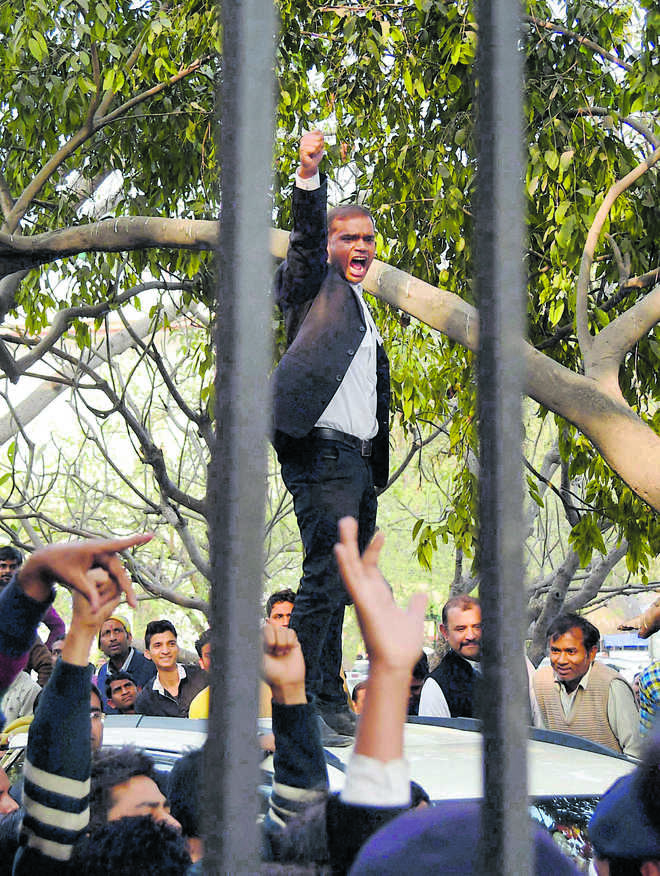
A lawyer shouts slogans at Patiala House Courts. PTI
Salil Desai
Once upon a time, politicians, government officials, public figures, criminals, celebrities, businessmen, ordinary folk — wrongdoers small or big — were uneasy about their misdeeds being exposed by the media.
Therefore, with the explosion in broadcast and social media, one would have thought that those under legitimate media fire would either be chastened by the evidence and have tough questions put to them, or at least feel the need to be contrite, even while putting up a defence.
Instead, what is being witnessed is a new-found brazenness and belligerence among those who face media grilling. Consider for instance the lawyers who recently thrashed Kanhaiya Kumar, other JNU students and journalists at the Patiala House Courts in full view of the cameras. Far from being repentant or fearful that there is clinching evidence of their involvement, the lawyers were later seen bragging about their acts with no trace of nervousness that might reasonably have been expected from anyone who realises the media has enough ammunition against them.
This attitude was also mirrored in the Delhi Police Commissioner’s responses to media questions when he seemed to justify the palpable inaction of his force (also caught on camera) with regard to the rampaging lawyers, and various other deplorable acts of commission and omission related to the JNU case, including the laughably shocking statement regarding students having to come forward to provide proof of their innocence.
Indeed, this has been an emerging pattern for some time – people who have serious charges to answer to, display a disturbing degree of nonchalance, defiance and even downright contempt when probed by the fourth estate, as if it simply does not matter and has no bearing on the final outcome whatsoever.
What explains this change in the way those in the dock are dealing with the media? How come squeamishness has been replaced by shamelessness? In fact, the media is no stranger even to displays of vicious hostility from some of the people they target. But on-camera mockery and chilling, unapologetic owning up of wrongdoing or its calm justification or flat refutation when there is no scope for even the fig leaf of plausible deniability, is quite new and galling.
Is one to conclude, therefore, that the media has simply lost its sting? That because of the overdose of television and social media in recent times, wrongdoers have finally discovered that it is just another toothless watchdog of democracy from which they have nothing to fear in practical terms? That it might bark vigorously and raise the alarm but can in the end do no real harm by itself, because the authorities and people it’s trying to awaken either don’t trust or heed the watchdog. Moreover, there are now so many watchdogs creating an incredible amount of din that people have just become fed up or immune to their howls or regard their cacophony merely as nightly acts of ‘crying wolf’, in a bid to compete with and outdo each other.
So has 24x7 news actually undermined the impact and credibility of journalism by exposing its many limitations? In times when there was no saturation coverage, the power of the media lay in the fear of possible consequences that might follow if skeletons tumbled out. But now even with hundreds of news channels, thousands of newspapers and infinite number of social media websites hammering away to nail all kinds of misdeeds and offences, it seems to inflict very little, lasting damage on the wrongdoers, beyond short-term clamour and outrage. This has emboldened them to gleefully cock a snook at the media, because far from causing a veritable thunderstorm in their lives, all it manages is a storm in a tea cup.
The shame and humiliation associated with being splashed uncharitably in the media is all but gone. Coupled with that is the negative perception about ‘presstitutes’ in the public eye as untrustworthy; over the top; judge, jury and prosecutor rolled into one; politically partisan; manipulative; unethical; TRP driven; deeply aligned to vested and commercial interests; and so on. This perception has made it easier for wrongdoers to treat the media with open disdain, exude bravado and pose like victims of a media witch hunt.
Obviously, the system in which we live is also responsible. If governance and rule of law are weak, if justice takes years to be delivered, the media’s best efforts cause no more than momentary discomfiture, which too is quickly forgotten.
How then can the media succeed in regaining some heft and respect? Perhaps the answer lies in sobering up — shedding its overbearing breathlessness and self-righteous, crusading tone which is terribly off-putting for most viewers and actually creates sympathy for those being grilled. Worse, the aggression and harangue rob journalism of its most valuable quality – the perception of objectivity and, therefore, credibility.
While TRP chasing is inevitable, can journalism afford to forget that public interest needs to be at the heart of the news stories, not the perception of scandal mongering? Secondly, can the media drastically slash political coverage or hysterical politicisation of all news? Why, for example, do we need sound-bytes from politicians on every issue? Thirdly, can media reduce the Delhi-centricity of news, as if all that matters is what happens in the Capital to be debated upon by sage commentators, based there? Finally, a vital question: are people really hankering for round-the-clock news? Should news channels run 24x7 at all?
Perhaps if media refashions, repositions and reorients itself, it might regain its standing as an important pillar of democracy, rather than just another interested party trying to peddle its wares – sensational news and dubious publicity.
Salil Desai is a Pune-based author and film-maker.



























